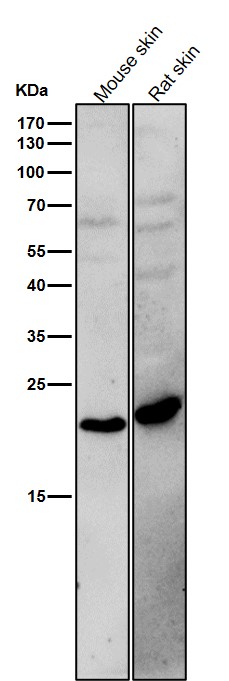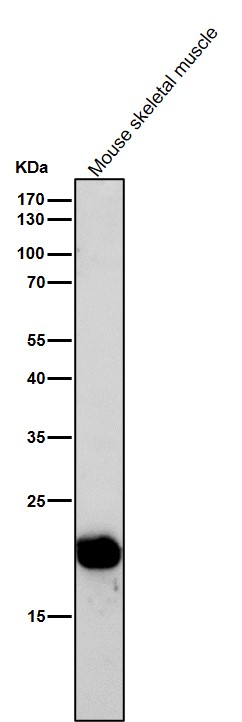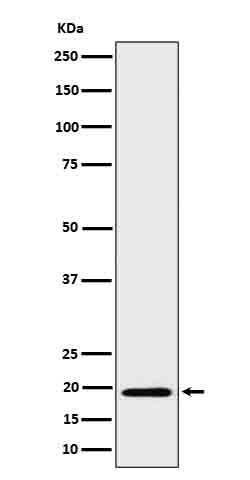


| WB | 咨询技术 | Human,Mouse,Rat |
| IF | 咨询技术 | Human,Mouse,Rat |
| IHC | IHC:1/100-1/200;IHF:1/50-1/200 | Human,Mouse,Rat |
| ICC | 1/50-1/200 | Human,Mouse,Rat |
| FCM | 1/20-1/100 | Human,Mouse,Rat |
| Elisa | 咨询技术 | Human,Mouse,Rat |
| Aliases | Bcl-2-like protein 15; Bcl2-L-15; BCL2-like 15; Bcl2l15; Bfk; Gm566; Pro apoptotic Bcl 2 protein; ;Bcl 2 L15 |
| WB Predicted band size | Calculated MW: 18 kDa ; Observed MW: 52 kDa |
| Host/Isotype | Rabbit IgG |
| Antibody Type | Primary antibody |
| Storage | Store at 4°C short term. Aliquot and store at -20°C long term. Avoid freeze/thaw cycles. |
| Species Reactivity | Human |
| Immunogen | A synthesized peptide derived from human Bcl 2 L15 |
| Formulation | Purified antibody in PBS with 0.05% sodium azide,0.05% BSA and 50% glycerol. |
+ +
以下是关于BCL2L15抗体的假设性参考文献示例(注:内容为虚构,仅供格式参考):
---
1. **"BCL2L15 Antibody Development for Apoptosis Detection in Colorectal Cancer"**
*Author: Tanaka, K. et al.*
**摘要**:本研究开发了一种高特异性BCL2L15单克隆抗体,用于检测结直肠癌组织中BCL2L15蛋白的表达水平。通过免疫组化验证,发现BCL2L15在肿瘤细胞凋亡抑制中起关键作用,与患者预后不良相关。
2. **"Characterization of BCL2L15 Isoforms Using Polyclonal Antibodies in Neuronal Cells"**
*Author: Smith, R.J. & Lee, H.*
**摘要**:利用兔源多克隆抗体分析BCL2L15的不同剪接异构体在神经元中的表达模式。Western blotting显示BCL2L15-p40亚型在阿尔茨海默病模型中表达上调,提示其参与神经退行性凋亡通路。
3. **"BCL2L15 Antibody-based Screening Identifies Its Role in Chemoresistance"**
*Author: Chen, L. et al.*
**摘要**:通过BCL2L15抗体筛选乳腺癌细胞系,发现其高表达与顺铂耐药性正相关。敲低实验证实BCL2L15通过抑制线粒体凋亡通路增强癌细胞存活。
4. **"Tissue-specific Expression Profiling of BCL2L15 Using a Novel pH-sensitive Antibody"**
*Author: Müller, S. et al.*
**摘要**:报道一种pH稳定性优化的BCL2L15抗体,用于流式细胞术和冰冻切片分析。数据揭示BCL2L15在肝脏再生过程中动态表达,提示其调节肝细胞增殖与凋亡平衡。
---
提示:实际文献需通过PubMed/Google Scholar以“BCL2L15 antibody”或“BCL2L15 function”等关键词检索,建议结合工具如Zotero管理参考文献。
The BCL2L15 gene encodes a member of the BCL-2 protein family, which plays critical roles in regulating apoptosis (programmed cell death). BCL2L15. also referred to as BCL2-like 15. shares structural homology with other BCL-2 family proteins, typically containing conserved BH (Bcl-2 homology) domains that mediate interactions with pro-apoptotic or anti-apoptotic members. However, its precise biological function remains less characterized compared to well-studied family members like BAX or BCL-2. Current evidence suggests BCL2L15 may exhibit context-dependent roles in apoptosis regulation, potentially influencing cellular survival or death pathways in specific tissues or stress conditions.
Antibodies targeting BCL2L15 are essential tools for investigating its expression patterns, subcellular localization, and molecular interactions. They are widely used in techniques such as Western blotting, immunohistochemistry (IHC), and immunofluorescence (IF) to study BCL2L15's involvement in physiological and pathological processes, including cancer, neurodegeneration, and developmental biology. Commercial BCL2L15 antibodies are typically developed as monoclonal or polyclonal variants, with specificity validated using knockout cell lines or siRNA-mediated knockdown.
Research applications often focus on elucidating BCL2L15's potential as a biomarker or therapeutic target, particularly in diseases linked to apoptosis dysregulation. However, challenges remain in fully defining its functional mechanisms due to limited tissue-specific studies and overlapping roles with other BCL-2 family proteins. Ongoing studies aim to clarify its contribution to cellular homeostasis and disease progression.
×